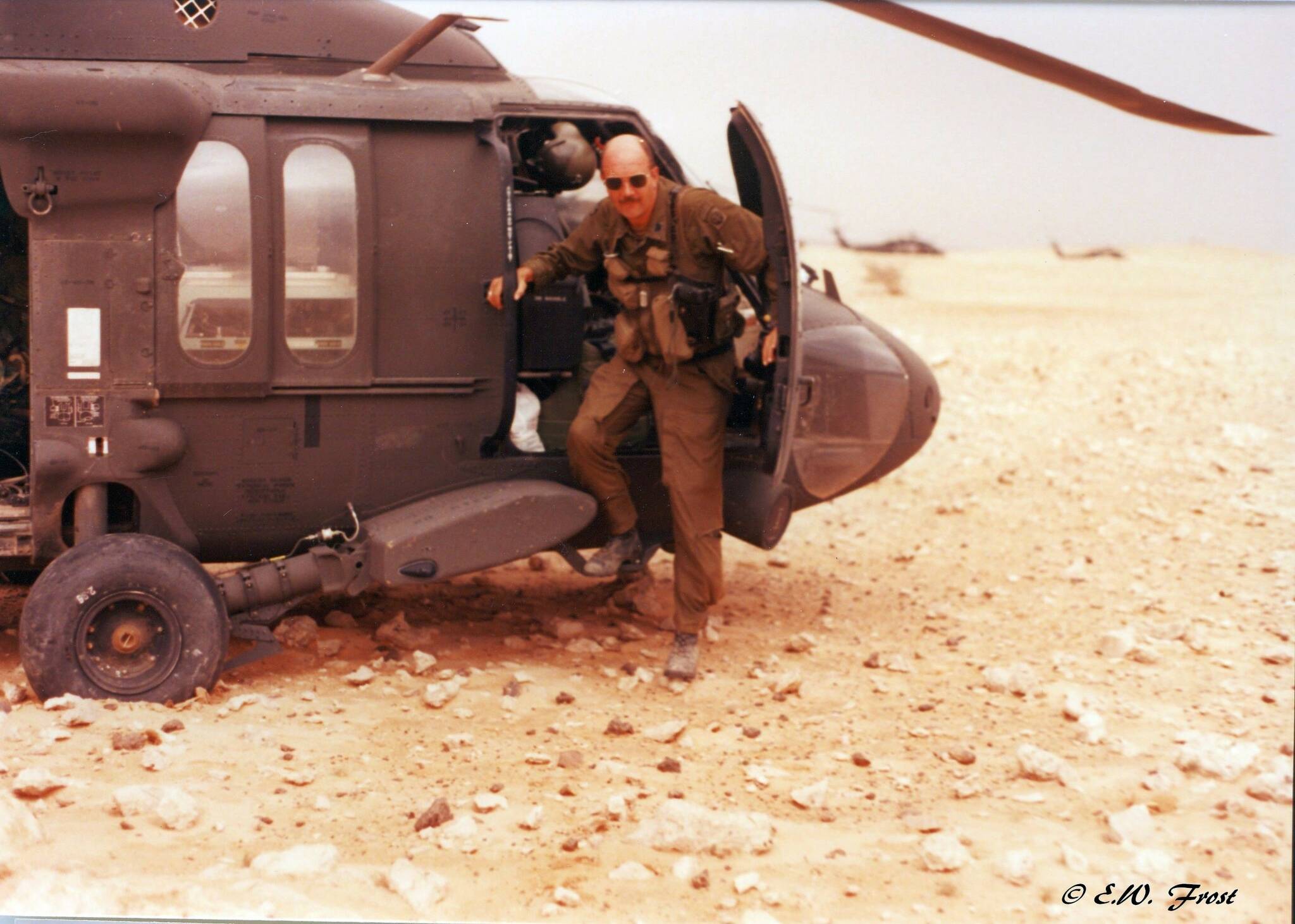Ernest William Frost II, also known as Bill, has vivid memories of the thick clouds of sand that would surround his helicopter as he tried to land safely in the Arabian Desert. It was already hard during the day, but even worse at night, despite the night vision goggles.
Though he could rely on his extensive flying experience, landing in such conditions was a nerve-racking endeavor that only his faith could make tolerable.
“It was some of the most challenging flying I had ever done,” he said.
At the time, Frost was flying EH-60 Blackhawk helicopters in Saudi Arabia and Iraq during the Desert Shield and Storm operations in 1990 and 1991.
Being on the ground didn’t provide opportunities to relax, either. In Iraq, his battalion had to be prepared to leave at a moment’s notice, which meant no tents. Instead, to elude Saddam Hussein, they had to sleep under poncho liners tied to the side of the aircraft.
Frost was always aware of the possibility that he wouldn’t be able to see his wife and two children again, but thankfully nothing happened.
If there is one thing that he has learned during his time serving the country, is to trust the Lord. A devout Christian, Frost is grateful to God for keeping him safe during his time in Vietnam and the Middle East.
“The Lord directs my path and where I go, so I just trust Him to guide and direct me,” he said.
Despite the challenges he’s encountered in his path, 77-year-old Frost can now enjoy a tranquil life in Dugualla Bay on North Whidbey, spending time with his wife and grandchildren.
Frost’s journey began in 1966, when in an attempt to avoid being drafted to Vietnam he signed up for the Coast Guard. After eight weeks of basic training in Alameda, California, he was transferred to Seattle where he set sail to Antarctica aboard the icebreaker “Burton Island.”
The ship would clear the way for supply ships headed towards McMurdo Station, a U.S. base in Antarctica. The operation is known as Deep Freeze, and it takes place every year.
Frost recalled feeling confused at his companions’ snickering as he checked the mail upon his return from the mission in 1968, but he soon realized what was going on. The very thing he had tried to avoid had come to get him: Vietnam.
That same year, after going through survival, escape, resistance and evasion training, he was sent to Vietnam and put in charge of sailing one of 26 82-foot-long ships the Coast Guard deployed to the South China Sea. Their job was to stop the Vietcong from smuggling weapons and other equipment into South Vietnam. Frost felt bad for the villagers who lived on the coast, stuck between the Vietcong and the Americans while trying to survive, and he is reminded of that whenever he reads today’s news.
At night, he would hear the sounds of a fight and feel grateful for being placed on a ship rather than on land to fight. However, while he was gone to R&R — military slang for “rest and recuperation” — in Australia, he was reminded his job entailed risks, too. The mortar on his ship exploded, killing two men, including the executive officer with whom he spent a lot of time together standing guard.
Frost spent 17 months in Vietnam, after his tour got extended. When he returned in 1970, he spent seven months working as a coxswain and running a 40-foot search and rescue boat in Elliott Bay in Seattle for the Coast Guard.
During his nine-year break from service, he earned a bachelor’s degree in physical education from Whitworth University in Spokane, a Bible Certificate from Multnomah University and a master’s degree in law enforcement from the University of Portland.
In 1977, he landed a job as a deputy sheriff in Clark County, Washington, where he worked for two years, later working in Seattle as a patrolman for three months before he got accepted into flight school.
In 1979, Frost joined the Army as a warrant officer and trained to become a helicopter pilot, later teaching pilots to fly UH-1 Huey and UH-60 Blackhawk helicopters at Fort Rucker, Alabama.
For two years, he served as a medevac — medical evacuation helicopter — pilot in South Korea, where he met his wife, Suzie, whom he married in 1982. Though he wanted to stay in South Korea, he was sent to Germany for three years flying with the 8th Infantry Division around the country.
In September 1990, he was assigned to the C Company, 82nd Aviation Brigade, 82nd Airborne Division, spending seven months flying helicopters in Saudi Arabia and Iraq and returned in April 1991.
Frost concluded 22 years of military service in 1997, retiring as a chief warrant officer. Following his retirement, he and his wife moved to his family property on Whidbey, where, after spending his childhood and adult years moving around, he could finally settle down.
After working as a corrections deputy in Coupeville and a school bus driver, Frost is now fully enjoying his retirement, traveling with his wife and continuing to document his adventures with his camera.
Among his extensive collection of photos from his time serving the country, Frost keeps a display of the many medals he was awarded through the years, including the Legion of Merit Medal, the Vietnam Campaign Medal and two Kuwait Liberation medals from Saudi Arabia and Kuwait.
Frost is one of the over 11,000 veterans who live in Island County that will be honored on Nov. 11 — Veterans Day.


